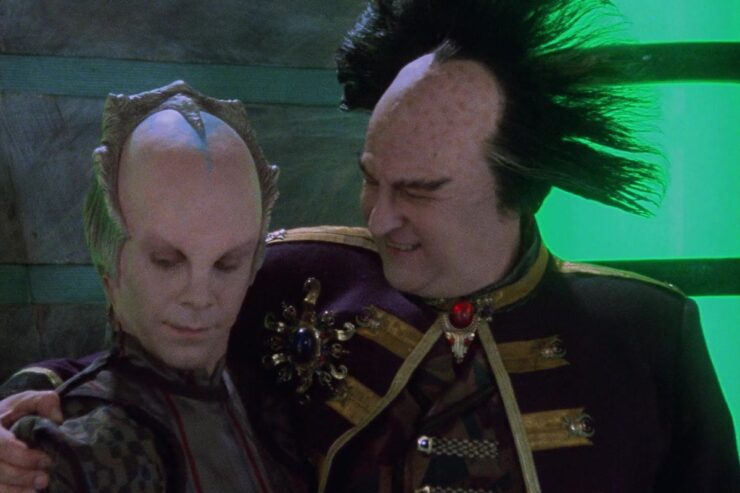“The Quality of Mercy”
Written by J. Michael Straczynski
Directed by Lorraine Senna Ferrara
Season 1, Episode 21
Production episode 117
Original air date: August 17, 1994
It was the dawn of the third age… A Centauri senator is instructing Mollari to make more of an effort to cultivate allies on B5. Mollari isn’t thrilled with the notion, but he gamely approaches Lennier in the hopes of bringing the Centauri and Minbari closer together. He starts by saying he wants to get to know Lennier better, and Lennier sums up his entire life to date in roughly two sentences. But upon realizing just how sheltered Lennier has been Mollari decides to show Lennier the B5 that he knows. Lennier is apprehensive, but goes along.
Franklin is running a free clinic in downbelow for people who can’t afford to be treated in medlab. (This is the first time in a score of episodes that the notion of payment for medical services has even come up.) Ivanova arrives to chastise him for operating the clinic illegally. However, she’s willing to look the other way, and even help, but she insists that she be kept in the loop about it.
Franklin is also surprised at how short the line is. It turns out there’s another healer in downbelow who’s offering free medical help, Laura Rosen. She hooks people up to a machine and they’re supposedly healed. Franklin assumes it’s some kind of scam.
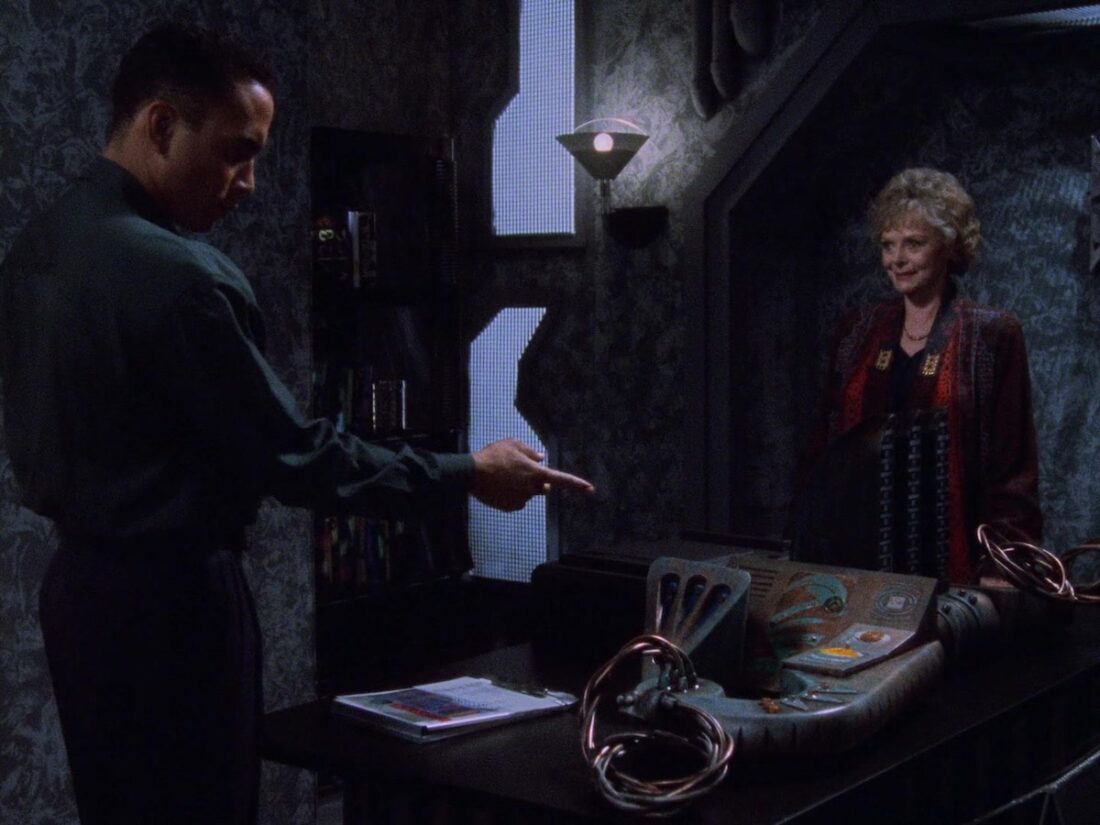
Ombuds Wellington finds Karl Mueller guilty of three counts of murder: two civilians and one of Garibaldi’s security people. Wellington meets with Sinclair, Ivanova, Garibaldi, and Winters to discuss sentencing. They don’t have the resources to imprison him for life, but the death penalty is only for treason, and no one’s willing to pay to have him shipped to their jail. That leaves only a mind-wipe as an option—death of personality, as it were. Winters’ job is to do a mind-probe so she can compare his mind after the wipe to it beforehand to make sure it works.
Garibaldi is sure that Mueller has killed a lot more than those three people, but Winters and Wellington are both clear on the fact that telepathic probes are not admissible in a court of law.
Mueller has to be dragged from the courtroom when Wellington passes sentence.
Garibaldi asks Franklin to set up the mind-wipe, and the doctor asks the security chief to check on Rosen.
Mollari brings Lennier to the Dark Star club to watch the exotic dancers. Mollari almost gets him an alcoholic drink until Lennier cautions him that alcohol makes a Minbari subject to homicidal rages. Lennier then proceeds to bore the crap out of Mollari, who is about to drink himself into insensibility until Lennier mentions that he’s an expert in probabilities. Mollari then brings Lennier to a poker game.
Winters scans Mueller, and it’s a horrible experience. Garibaldi’s instincts were correct: he’s killed dozens, and he’s not remotely contrite about it.
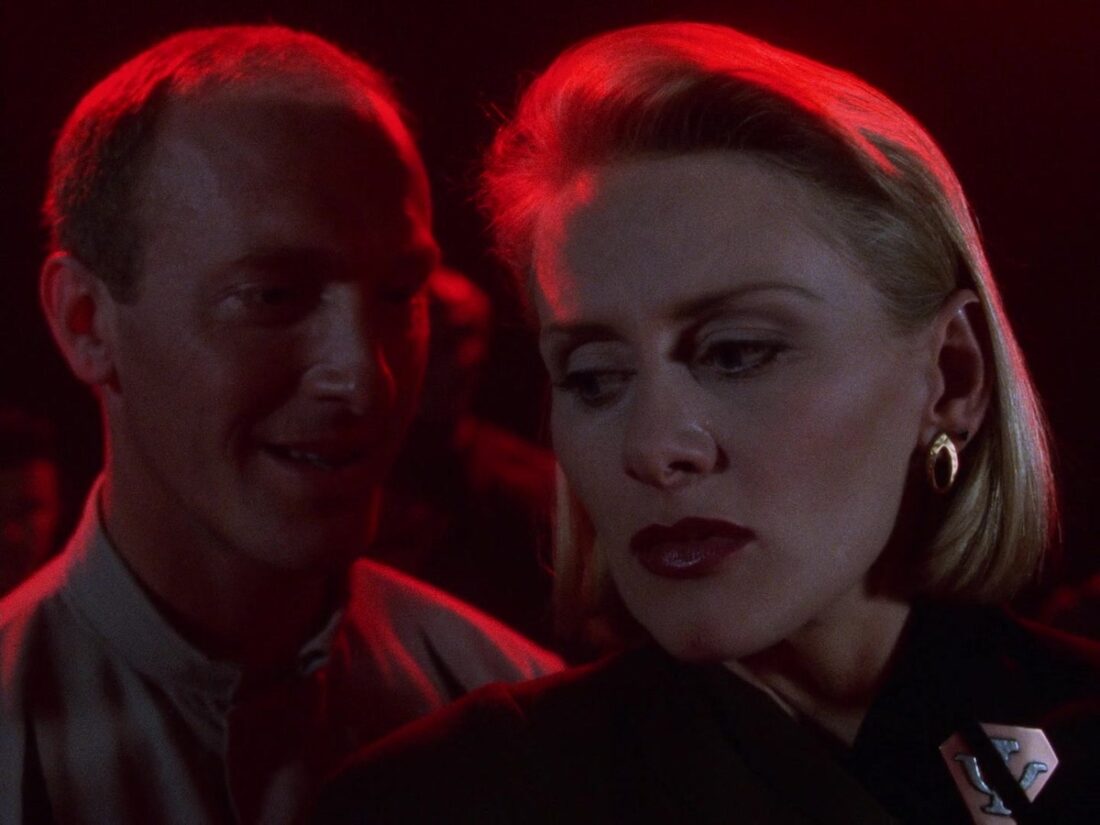
Franklin sees some of Rosen’s patients at his free clinic, but they have legitimately been healed. He also learns from Garibaldi that she lost her medical license after she became addicted to stims.
He goes to Rosen, and they speak frankly. The device transfers life energy from one person to another. It was apparently used by the aliens she salvaged it from as a punishment device for criminals: their life force would be taken from them and used to heal the sick. But Rosen has figured out how to reduce the settings so she can just give up a bit of life energy to heal people of various ailments. Franklin’s immediate concern is that she’s slowly killing herself, but she reveals that she has Lake’s Syndrome, which is fatal and for which there is no cure.
Rosen is determined to find out the full details of how the thing works before she dies. She asks Franklin not to tell Rosen’s daughter, Janice (a merchant in the Zocalo) the full truth about the device, and she also bequeaths the machine to Franklin for after she’s gone.
While being escorted to medlab for his mindwipe, Mueller escapes custody, taking one of the PPGs with him—but also having been shot in the shoulder. Franklin’s first thought, given that Mueller is wounded, is to warn his assistant at the free clinic and also Rosen, as they’re two places a wounded fugitive might go.
He arrives at Rosen’s clinic to see that Mueller is already there, a PPG pointed at Janice. Rosen is using the machine to heal Mueller’s wound.
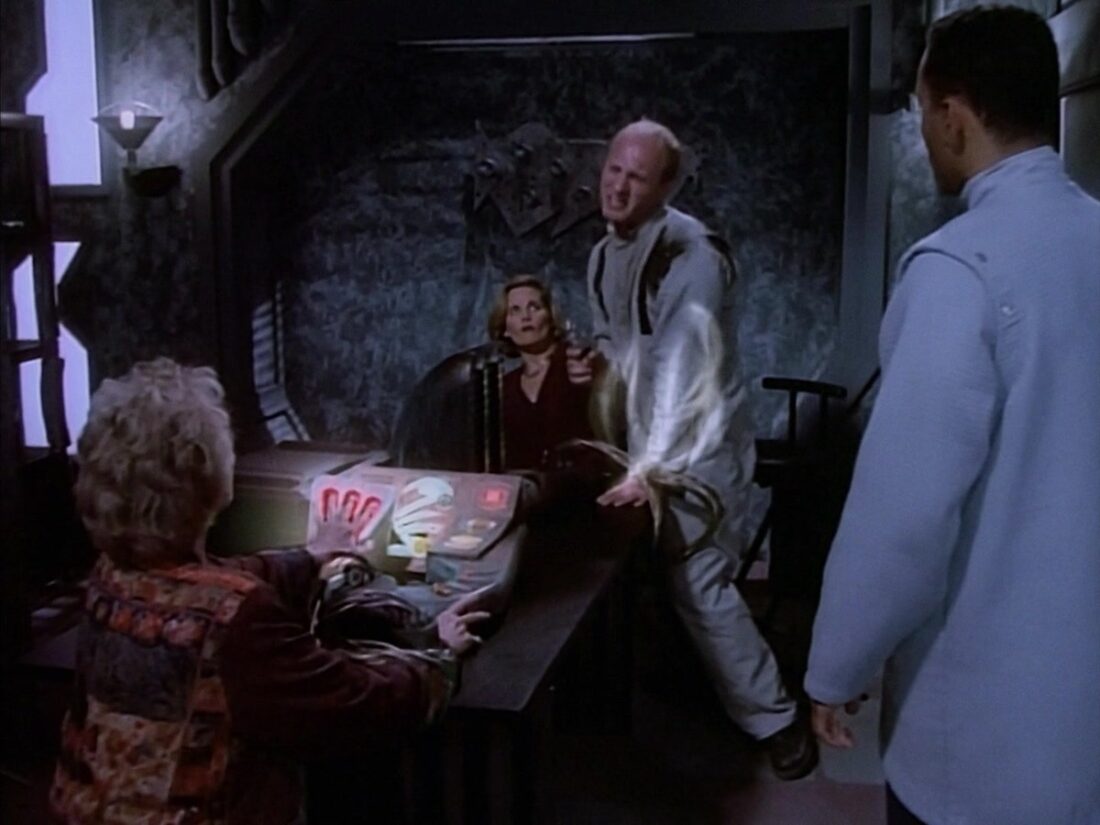
Lennier and Mollari are cleaning up at poker. The former is due to his mathematical skills. The latter is due to his using one of his sex organs (a prehensile tentacle that grows out of his torso) to swap cards out. However, Mollari is found out when a water pitcher is placed on top of his tentacle. A bar fight ensues, in which Lennier shows off his hand-to-hand chops.
Rosen reverses the polarity on the alien machine, which transfers the Lake’s Syndrome from herself to Mueller. He dies in short order.
Wellington rules in favor of Rosen, saying she was acting in self-defense. She’s free on the condition that she turn the machine over to Franklin, which she does willingly. She’s going to travel, try to see if she can find out more about the machine’s origins and workings.
Lennier lies to Sinclair by saying that the bar fight was entirely his fault. Sinclair can’t prosecute either of them due to their diplomatic status, but the bar’s owners are rather insisting that the pair of them pay for repairs, which they both readily agree to.
Nothing’s the same anymore. Sinclair very obviously does not believe Lennier’s bullshit story about who started the fight, mostly because he’s met Mollari. But he goes along with it because—well, he doesn’t entirely have a choice…
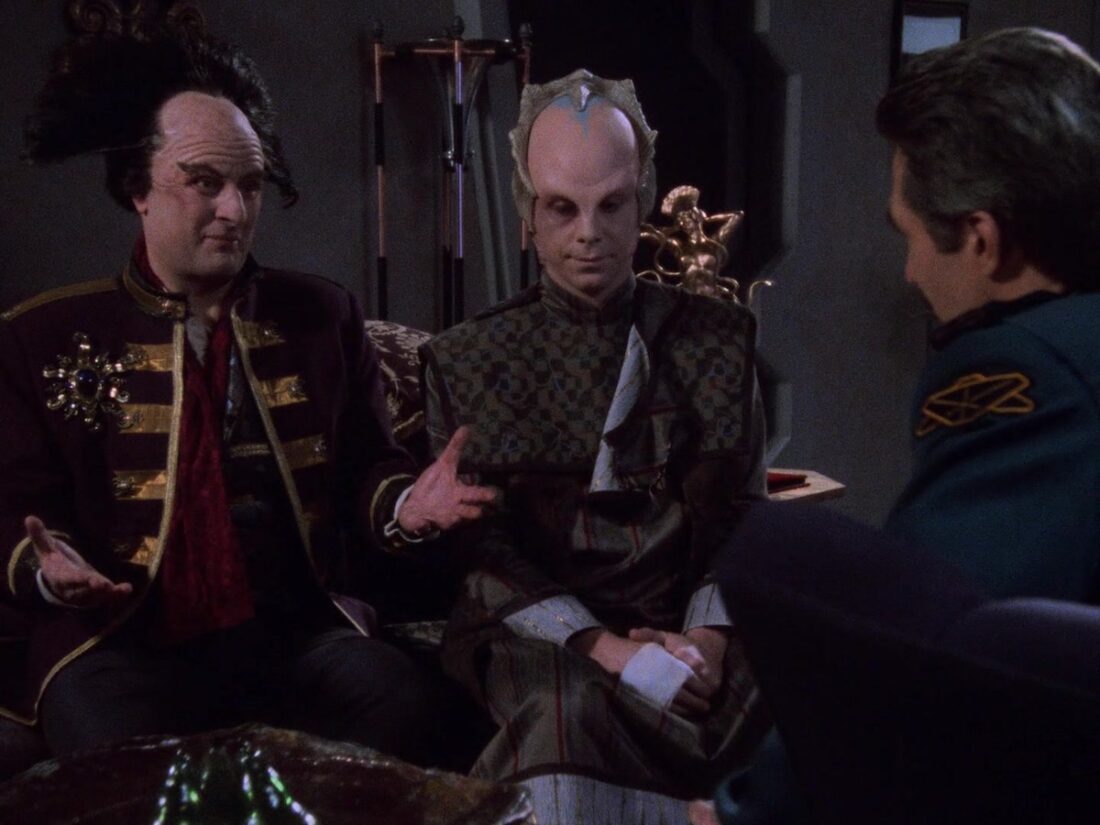
Ivanova is God. When Ivanova comes to Franklin’s clinic, his back is to the door and he assumes she’s a patient and asks her to take her clothes off. She tartly replies that he has to buy her dinner first.
The household god of frustration. Garibaldi is pretty red-assed about Mueller killing one of his guys and advocates the death penalty for him, and also advocates Winters find out if he committed more murders.
His security personnel are also incapable of escorting a convicted murderer down a corridor without the murderer escaping. Good job, there security chief!
If you value your lives, be somewhere else. Lennier explains to Mollari that he lied—even though Minbari find lying to be detestable—because it is honorable to help a friend save face. And Mollari’s face is definitely in need of saving…
In the glorious days of the Centauri Republic… We find out that Centauri men have six sex organs, three on each side. Makes you wonder how they ever thought humans would go for the notion that humanity was a lost Centauri tribe, given the significant differences in anatomy…
The Corps is mother, the Corps is father. Telepaths who are qualified to work on criminal cases the way Winters does in this episode are few and far between, as the work is grueling and folks who do it burn out quickly. Winters only is qualified because she did it on Mars, and is very reluctant to do it here…
No sex, please, we’re EarthForce. Franklin flirts a bit with Janice, and she agrees to go to dinner with him at the end. However, she’s never seen or mentioned ever again.
Looking ahead. Unlike far too many science fiction shows that introduce a wild piece of technology and then completely forget all about it, the healing machine will be seen again and used in “Revelations” and “Endgame.”
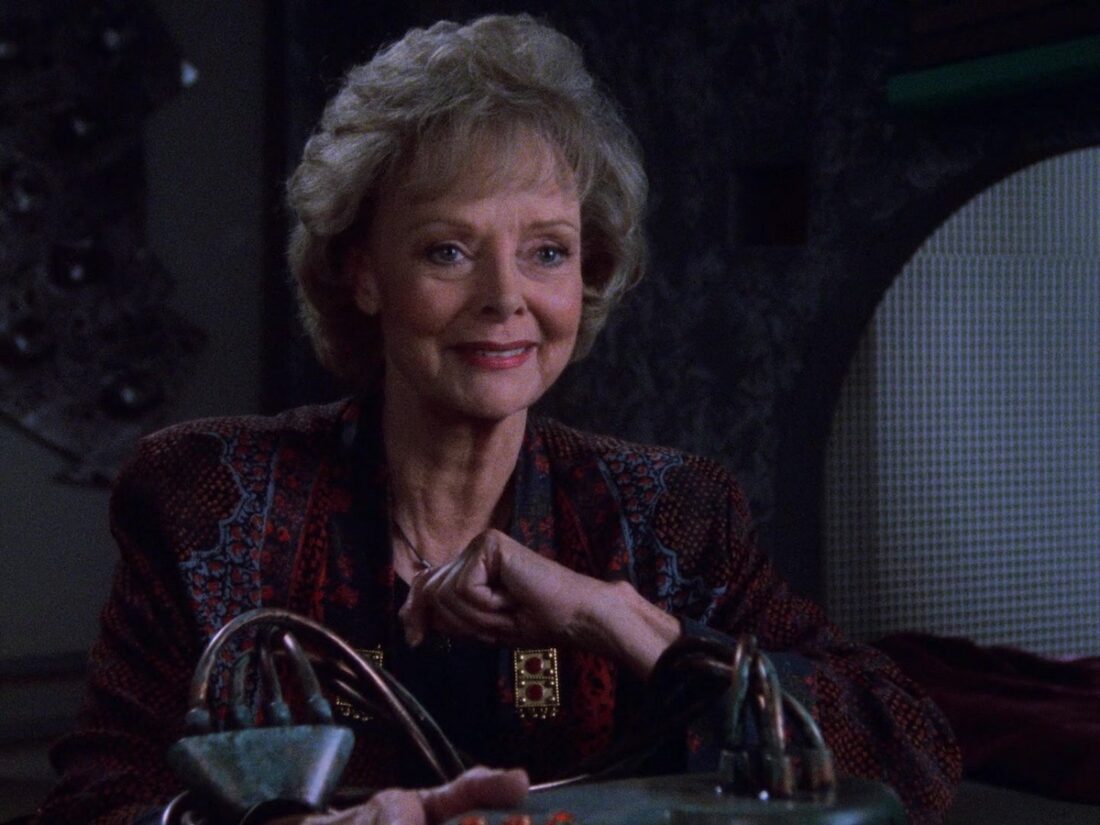
Welcome aboard. Jim Norton is back from “Grail” as Wellington; the actor will return in two different non-human roles in “Confessions and Lamentations” and “Dust to Dust.” David L. Crowley is back from “Eyes” as Welch; he’ll next be in “Revelations.”
Damian London debuts his recurring role of a Centauri official to give Mollari someone to talk to (or be talked at) back home; we’ll see him next in “Sic Transit Vir.” Mark Rolston leans into his typecasting as bad guys as Mueller, while Kate McNeil plays Janice.
But the big guest is the great June Lockhart—among many other things, Bill Mumy’s co-star on the original Lost in Space—as Rosen. (Mumy and Lockhart don’t have any scenes together, alas.)
Trivial matters. It was established in “Deathwalker” that Winters had experience scanning the mind of a serial killer on Mars.
This episode establishes that Minbari count in base-11.
The Dark Star club was previously seen in “Born to the Purple.”
J. Michael Straczynski has said that the spelling out of the laws regarding the admissibility of telepathic probes in a court of law grew out of online discussions by fans of the matter.
The echoes of all of our conversations.
“I’m still waiting for an explanation, gentlemen.”
“Yes, and I’m prepared to give you one, Commander—as soon as the room stops spinning.”
“This station creates gravity by rotation—it never stops spinning.”
“Well, you begin to see my problem, hm?”
—Sinclair reading the riot act, and Mollari tap-dancing.
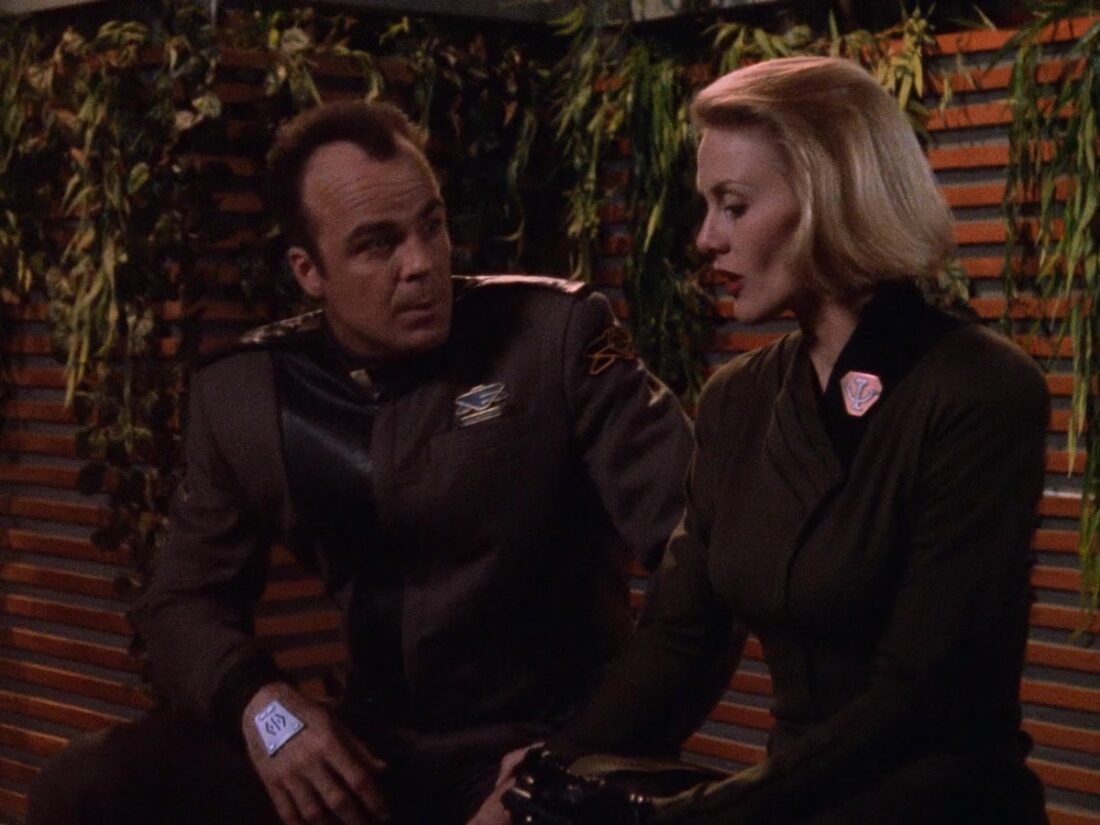
The name of the place is Babylon 5. “I did the necessary thing—that isn’t always the same as the right thing.” There’s one issue I have with this episode, and it applies in general to the world-building of the station: since when do people have to pay to use medlab?
I mean, if it’s a purely capitalistic endeavor—or at least is one for civilians, since I doubt that the military personnel have to pay for treatments—then, for starters, the entire plot of “Believers” goes out the window. All the Onteens had to do was refuse to make payment and walk out, and the entire plot changes. And we’ve never seen any kind of billing procedure, even though plenty of non-military personnel have gone through medlab.
But the plot of this episode doesn’t work if there isn’t a free clinic in downbelow, so writer/creator/producer J. Michael Straczynski just defaulted to the status quo of the United States at the time he was writing the episode, which is, to be blunt, lazy world-building. The trend in the world at large is toward free healthcare, and it was thirty years ago, too. The U.S. is the glaring exception, not the norm.
Once you get past that, this is a fine episode. The Mollari/Lennier subplot is fun mostly in the amusing jock-nerd contrast that Peter Jurasik and Bill Mumy give us. Indeed, this rather hoary plot really only works because of the talent of these two actors, with Jurasik’s good-natured sleaze and Mumy’s earnest naïveté selling it.
I like the fact that jurisprudence on the station is dictated by factors that have nothing to do with justice and everything to do with expediency—which is how things always work. A space station doesn’t have the resources to feed, clothe, and house a prisoner for the rest of his life, the death penalty is very limited (that is a good bit of world-building, as the trend in general has also been toward fewer and fewer capital crimes), and transporting a prisoner is a much more complicated thing when you’re talking interstellar distances.
And if you’re proposing a world with telepaths, then the notion of death of personality becomes realistic as a criminal sentence. It has the same possible benefit of the death penalty—to wit, removing a murderer from the commonweal—but without the state having the power of life and death over its citizenry and truly allowing for the possibility of rehabilitation, even if it’s artificially catalyzed.
Finally, June Lockhart is never not wonderful, and I love that the alleged quack faith healer isn’t someone ostentatious or ridiculous, but just an old woman who wants to help people. Lockhart has a quotidian simplicity to her Hippocratic passion that is very compelling and feels very real.
Plus, they now have a handy deus ex machina for future episodes!
Next week: We take the week off for Labor Day and for your humble rewatcher to go to Dragon Con. In two weeks: “Chrysalis.”










